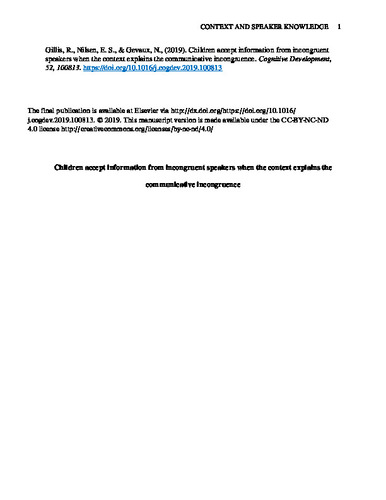| dc.contributor.author | Gillis, Randall L. | |
| dc.contributor.author | Nilsen, Elizabeth S. | |
| dc.contributor.author | Gevaux, Nicole S. | |
| dc.date.accessioned | 2021-09-21 13:50:08 (GMT) | |
| dc.date.available | 2021-09-21 13:50:08 (GMT) | |
| dc.date.issued | 2019-07-30 | |
| dc.identifier.uri | https://doi.org/10.1016/j.cogdev.2019.100813 | |
| dc.identifier.uri | http://hdl.handle.net/10012/17448 | |
| dc.description | The final publication is available at Elsevier via http://dx.doi.org/https://doi.org/10.1016/j.cogdev.2019.100813. © 2019. This manuscript version is made available under the CC-BY-NC-ND 4.0 license http://creativecommons.org/licenses/by-nc-nd/4.0/ | en |
| dc.description.abstract | Past work has shown that children are less likely to solicit information from speakers who use incongruent communicative cues (i.e., demonstrate an emotion nonverbally that differs from the emotional valence of the words) versus those who use congruent cues. The present study explored whether school-age children show flexibility in their decisions to avoid incongruent speakers based on the situational context and speakers’ awareness of the context. Older children (9–10 years old), but not younger children (7–8 years old), demonstrated this flexibility. Within a speaker reliability paradigm, incongruent speakers were more likely to be solicited for information when the situational context rendered their affect more appropriate. Moreover, older children showed appreciation for the speakers’ perspective; they were more likely to solicit information from incongruent speakers when the speaker was aware (versus unaware) of the context. Such findings demonstrate the growth in children’s ability to integrate various cues when judging information sources across the school-age years. | en |
| dc.description.sponsorship | Funder 1, This research was supported by a Social Sciences and Humanities Research Council Standard Research Grant awarded to EN. | en |
| dc.language.iso | en | en |
| dc.publisher | Elsevier | en |
| dc.relation.ispartofseries | Cognitive Development; | |
| dc.rights | Attribution-NonCommercial-NoDerivatives 4.0 International | * |
| dc.rights.uri | http://creativecommons.org/licenses/by-nc-nd/4.0/ | * |
| dc.subject | Communication | en |
| dc.subject | Speaker credibility | en |
| dc.subject | Non-verbal cues | en |
| dc.subject | Emotion recognition | en |
| dc.subject | Perspective-taking | en |
| dc.subject | Selective trust | en |
| dc.title | Children accept information from incongruent speakers when the context explains the communicative incongruence | en |
| dc.type | Article | en |
| dcterms.bibliographicCitation | Gillis, R., Nilsen, E. S., & Gevaux, N., (2019). Children accept information from incongruent speakers when the context explains the communicative incongruence. Cognitive Development, 52, 100813. https://doi.org/10.1016/j.cogdev.2019.100813 | en |
| uws.contributor.affiliation1 | Faculty of Arts | en |
| uws.contributor.affiliation2 | Psychology | en |
| uws.typeOfResource | Text | en |
| uws.peerReviewStatus | Reviewed | en |
| uws.scholarLevel | Faculty | en |


